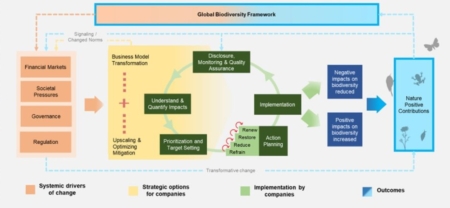Pioneering Nature-Positive Pathways: Organisational Approaches for delivering Nature RecoveryProject
Understanding the methods and actions required by large organisations to deliver effective and equitable biodiversity outcomes in line with achieving global nature recovery goals.
There is an increasing expectation that the private sector will need to play an important role in delivering global nature recovery goals. However, there are currently large uncertainties associated with the processes and strategies required for actions to be effective. For example, organisations can take a range of actions across the Mitigation and Conservation Hierarchy to help deliver biodiversity outcomes, but there is a need to understand the outcomes of such actions, how these actions and outcomes will scale, and the best means of navigating trade-offs and synergies between other socio-economic and environmental goals. In addition, there is limited understanding of the overall sectoral and regulatory approaches which can best promote effective and equitable action by large organisations.
In this work package, we hope to help inform effective, equitable, scalable, and feasible strategies for organisations to address biodiversity loss by:
- Developing a research agenda to prioritise research towards key areas in organisational Nature Positive strategies.
- Investigating the methods used to measure positive and negative biodiversity impacts of organisations, and their implications for the design of Nature Positive strategies.
- Understanding when and where possible actions across the Mitigation and Conservation Hierarchy could be implemented to deliver Nature Positive goals.
- At a broader scale, looking at actions required at sectoral, national, and international levels, to ensure organisational actions contribute meaningfully towards global targets.
- Investigate the wider driving processes that can influence action and its effectiveness.
- Understand the likely outcomes of different actions taken by organisations, and in collaboration with the wider Integration work package team, investigate the likely environmental, economic, and social synergies and trade-offs if such strategies are scaled.
This work is conducted as part of the Oxford Nature Positive Hub.
Project outputs
- Integration
- Integration
Talitha Bromwich, Thomas White, Alice Bouchez, Isobel Hawkins, Sophus zu Ermgassen, Joseph W. Bull, Harriet Bartlett, Leon Bennun, Elizabeth Biggs, Hollie Booth, Michael Clark, Sami El Geneidy, Graham Prescott, Laura Sonter, Malcolm Starkey, and E.J. Milner-Gulland (2024). PREPRINT: Navigating uncertainty in LCA-based approaches to biodiversity footprinting. Methods in Ecology and Evolution.
The use of Life cycle assessment (LCA) methods is rapidly expanding as a means of estimating the biodiversity impacts of organisations across complex value chains. However, these methods have limitations and substantial uncertainties, which are rarely communicated in the results of LCAs. Drawing upon the ecological and LCA literature on uncertainty and two worked examples of biodiversity footprinting, we outline where different types of uncertainty occur across multiple stages of the LCA process, from input data to the choice of biodiversity metric. Some uncertainties are epistemic, incorporating structural (e.g., the types of pressures included in models), parametric (e.g., uncertainty around conversion factors), and measurement uncertainty, as well as natural variability, stochasticity, and information gaps.
Thomas White, Talitha Bromwich, Ashley Bang, Leon Bennun, Joseph W. Bull, Michael Clark, E.J. Milner-Gulland, Graham Prescott, Malcolm Starkey, Sophus zu Ermgassen, Hollie Booth (2023). The Nature Positive Journey for Business: A research agenda to enable private sector contributions to the global biodiversity framework.. OSF Preprint.
As a group of researchers and consultants working at the interface between business and biodiversity, we propose a conceptual model through which private sector contributions to a Nature Positive future could be realised and use it to identify priority research questions.









